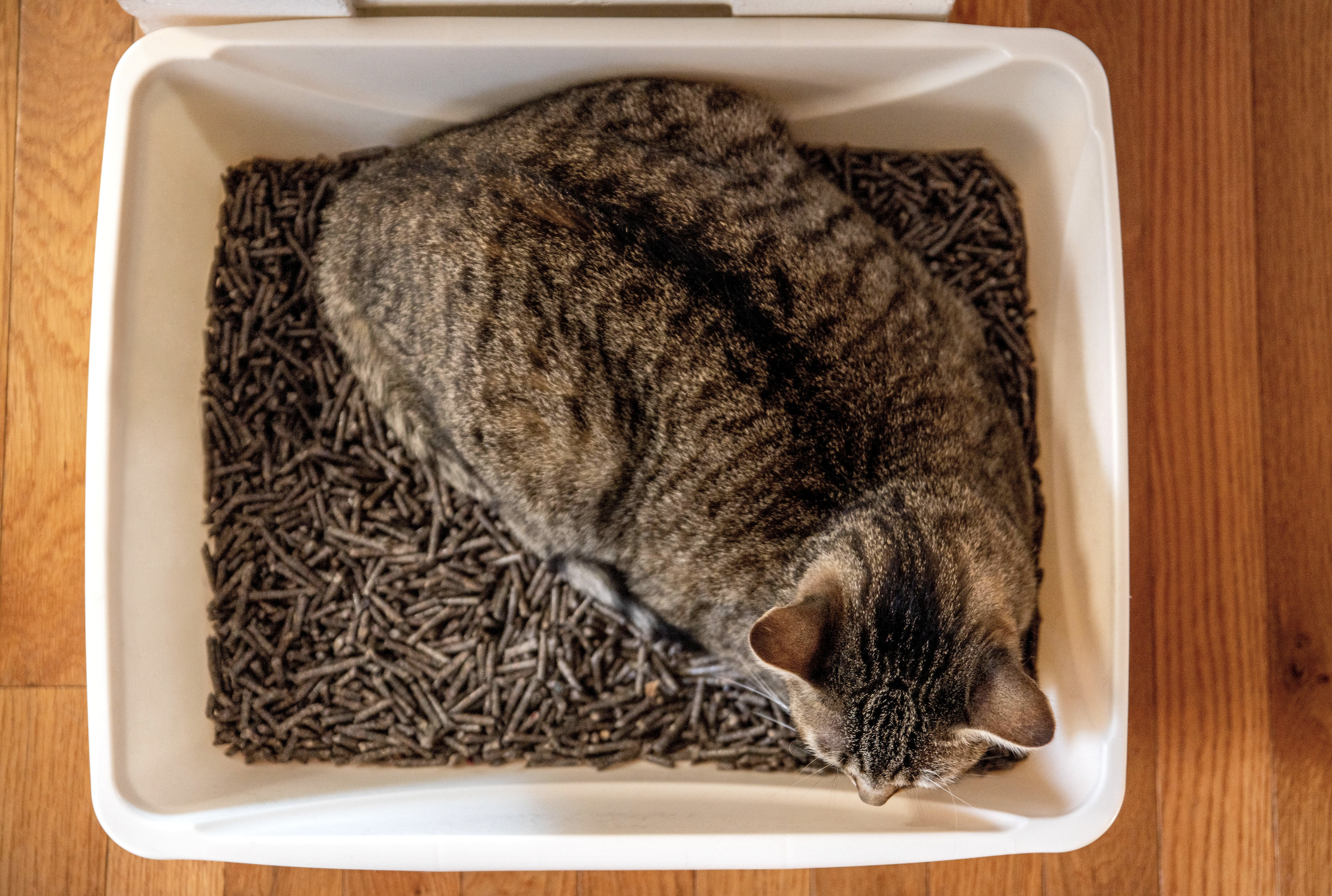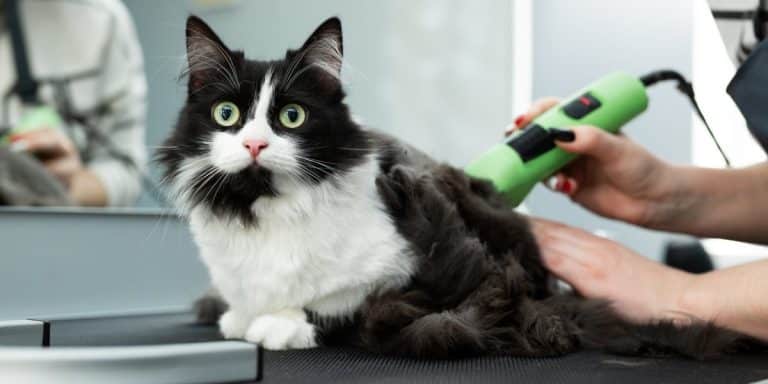Common Reasons Your Cat Laying in Litterbox
Don’t you think cats are enigmatic creatures, often exhibiting behaviors that amuse us?
One such behavior that can be particularly confusing for cat owners is finding their cat lying in the litterbox. It is natural to wonder why they would choose such an unusual spot for a nap.
From kittens to grown-up cats, each one might have their reasons for snuggling in their litterbox.
By knowing these reasons, you will be better prepared to help your cat if they need any help or if something is bothering them.
After all, it is important to keep our cat pets happy and comfortable and feel safe and content in their special little space.
In this blog, we will understand why your cat might be doing such a strange thing.
Why Do Kittens Tend to Sleep in Their Litterbox?
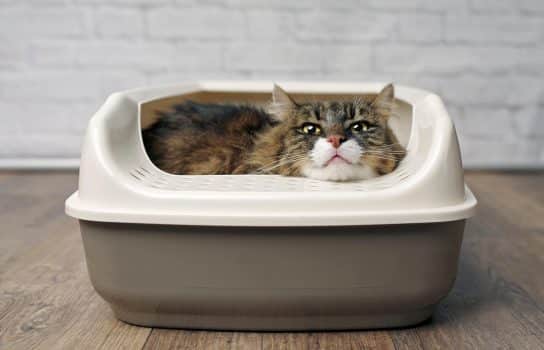
1. Comfort and Familiarity
Kittens find comfort in familiar places. For them, the litterbox is like their little safe space. It smells like them, and they recognize it as a spot where they do business. This familiar scent makes them feel secure. When a kitten is very young, they might feel more at ease in a place that smells like them.
2. Warmth and Coziness
Kittens love warmth. Sometimes, the litter in the box can be warm, especially if recently used. It’s like a cozy, soft bed for them. They might curl up in there to take a nap because it feels snug and pleasant.
3. Mimicking Mother’s Nest
When birth, kittens stay with their mom in a special nest she creates. This nest is a warm, safe place where they sleep and grow. The litterbox, to a young kitten, might seem like a similar cozy spot. They may feel like they’re in a nest, which comforts them.
4. Seeking Solitude
Just like people, kittens sometimes want alone time. When tired or want a break from playing, they might choose the litterbox as a private space. It’s like their own little hiding spot where they can have some peace.
5. Curiosity and Exploration
Kittens are naturally curious. They want to check out everything around them, including their litterbox. Sometimes, they might climb in to see what it’s like. Once inside, they might find it surprisingly comfy and decide to take a little nap.
6. Stress or Anxiety
Sometimes, if a kitten is feeling stressed or anxious, they might seek out a confining space like a litterbox.
It makes them feel secure and protected. If there have been changes in their environment or if they’re feeling unwell, they might retreat to their litterbox for comfort.
Ultimately, when we see a kitten sleeping in their litterbox, it’s important not to be too worried. It’s usually a sign that they feel safe and comfortable.
However, if this behavior continues for an extended period or is accompanied by other concerning signs, it’s a good idea to consult a vet.
Remember, our little furry friends have unique ways of finding comfort and security, and sometimes that might mean snuggling up in their litterbox for a nap!
Common Reasons Why Cats Sleep in Their Litterbox
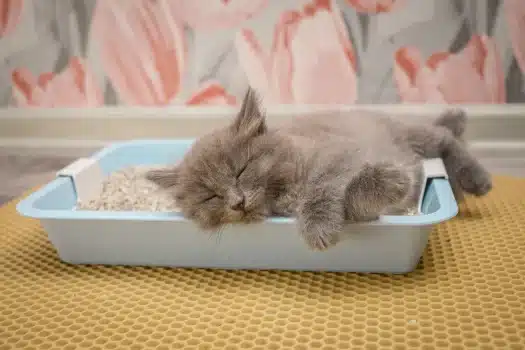
Sometimes, we see our cats acting strange and doing odd behaviors like cats lying in the litterbox. This might look odd. But there are some common reasons. Let us explore some of them.
1. Stress or Anxiety
Sometimes, if something in a cat’s home changes, like a new pet or moving to a new place, they might feel worried or uneasy. In these moments, they might go to their litterbox because it feels safe and familiar.
2. Medical Issues
Just like people, cats can sometimes feel unwell. If a cat is experiencing discomfort or pain, they might think that being in their litterbox makes them feel better.
3. Territorial Behavior
Imagine if you and your friend shared a room and someone wanted to show they were the leader. Cats can feel similar. If there are other cats around, one might choose to sleep in the litterbox to say, “This is my space!”
4. Improper Litterbox Setup
Picture if your toilet was small or messy or in a noisy or busy place. You might not want to use it! Cats feel the same way. If their litterbox is not right for them, they might not want to use it properly. They might even sleep in it instead!
5. Uncomfortable Surfaces
Imagine if your bed was full of lumps and bumps. You wouldn’t want to sleep there. Similarly, if a cat’s bed or resting place isn’t comfy, they might choose the litterbox instead. They might think it’s a better place to rest.
6. Feeling Hidden and Safe
Sometimes, cats like to have a quiet and private space. The litterbox has walls, making a cat feel hidden and safe. So, if a cat feels shy or uncertain, they might snuggle up in their litterbox. It’s like their own little hideaway!
7. Comfortable and Warm
Just like we enjoy being in a warm and cozy place, cats do too! Sometimes, the litter in the litterbox can be warm, especially if they’ve just used it. This can make it feel like a comfy spot for them to rest.
8. Eagerness
Cats are very curious creatures. They like to check out new places and things. Sometimes, a cat might hop into their litterbox to see what it’s like there. It’s like an adventure for them!
9. Wanting Attention
Cats love spending time with their humans. If they feel a bit lonely or want some extra cuddles, they might hang out in the litterbox because they know you’ll come to find them. It’s like their way of saying, “Come and play with me!”
10. Feeling Safe During Changes
Sometimes, when things are changing in a cat’s home, like new furniture or people visiting, they might feel a bit unsure. The litterbox is like their own little sanctuary. It’s where they know everything stays the same, no matter what’s happening outside.
What are the Medical Reasons Cats Lie in Their Litterboxes?
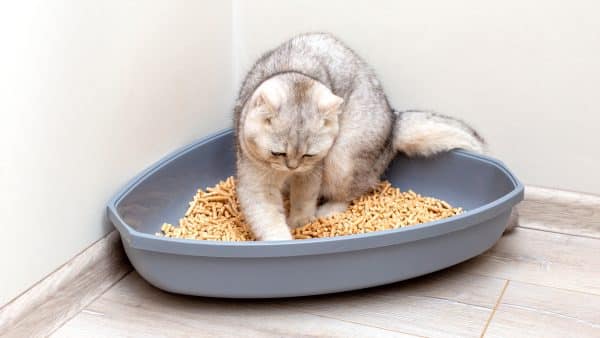
Cats are curious creatures, each with their habits and behaviors. Sometimes, you might notice your cat spending more time in their litterbox than usual. This behavior can be a cause for concern, but there are various medical reasons behind it that we should explain.
1. Urinary Tract Infections (UTI)
One of the most common reasons why your cat is sleeping in a litterbox is because they might be experiencing a urinary tract infection (UTI).
Just like humans, cats can also get infections in their urinary system. This can make it painful for them to urinate, so they might try to do it more often, leading to more time spent in the litterbox.
2. Constipation Or Difficulty in Passing Stool
Imagine having trouble going to the bathroom- it would make you feel uncomfortable, and you might want to stay near the toilet in emergencies.
Cats feel the same way. They might be constipated or having difficulty passing stool, so they stay close to their litterbox in hopes that it will provide relief and make them feel comfortable.
3. Diarrhea
Just like human beings, cats can have tummy troubles too. If they are experiencing digestive upset or diarrhea, they might spend more time in their litterbox because they feel like they must go frequently. They may also associate the litterbox with relief from their discomfort.
4. Bladder Stones
Cats can develop bladder stones, which can cause pain and make them feel like they have to urinate frequently. This can lead to them staying in their litterbox for a long period.
5. Stress or Anxiety
Cats are sensitive creatures, and they can feel stressed or anxious, just like human beings. Feeling this way, they might seek out their litterbox as a safe and familiar place, which is like a security blanket.
6. Pregnancy or Labour
During pregnancy or when she is about to give birth, she might prefer to stay close to her litterbox.
7. Other Medical Conditions
Sometimes, cats might have underlying medical conditions that are not immediately obvious. It could be anything from an internal problem to a pain they are experiencing. In such cases, they might seek out their litterbox for comfort.
What You Can Do When You See Your Cat Laying in Litterbox
If you notice your cat spending excessive time in their litterbox, it is important to observe their behavior and look for signs of distress or discomfort.
If this behavior persists for over a day or two, it is best to consult a veterinarian. They have the expertise to diagnose and treat any potential medical issues.
While it might seem strange when your cat spends extra time in their litterbox, there are valid reasons for this behavior.
Understanding these reasons can help you provide the necessary care and attention your cat needs. Always remember, if you are unsure, it is better to seek advice from a veterinarian to ensure your cat’s well-being.
How Do I Stop My Cat from Sleeping in The Litterbox?
Cats are wonderful pets, but sometimes they can develop odd habits, like sleeping in their litterbox. This behavior may seem strange, but it is important to understand why it happens and how to stop it.
Let us check the easy and effective ways to keep your cat from sleeping in their litterbox, ensuring their comfort and hygiene.
1. Understanding The Problem
First, figure out why your cat is lying in the litterbox. It could be due to stress, discomfort, or a feeling of security. Cats are creatures that have different habits, and they sometimes find solace in familiar places.
It is also possible that your cat’s litterbox is in a quiet, private spot, making it seem like a good place to rest. Whatever the reason, it is essential to address this behavior for the well-being of your cat pet.
2. Create a Comfortable Resting Area
One way to discourage your cat from sleeping in the litterbox is by providing a cozy and inviting alternative. Choose a soft bed or cushion and place it in a quiet corner where your cat feels safe.
Make sure it is away from the litterbox but still in an area where your cat likes to spend time in it. Adding a favorite toy or blanket can make this spot even more appealing.
3. Keep the litterbox Clean
Cats are clean animals. So, it would be best if you always kept their litterboxes clean. Make sure to clean the litterboxes and change the litter regularly.
This will not only keep your cat’s restroom clean but also make it less inviting for any kinds of bugs and insects. Cats prefer clean environments, so maintaining a tidy litterbox area is crucial.
4. Offer Mental and Physical Stimulation
If your cat is using the litterbox as a place to relax, it might be a sign that they need more mental and physical activity. Engage your cat with interactive toys, play games, and provide opportunities for exploration. This will help burn off their excess energy and reduce stress, making your cat less inclined to seek refuge in their litterbox.
5. Use a litterbox Cover or Enclosure
Consider using a litterbox cover or enclosure to create a private and secure space for your cat’s restroom. This will not only give your cat a sense of privacy but also discourage them from using it as a sleeping spot. Ensure the cover has proper ventilation and is large enough for your cat to move comfortably.
6. Monitor for Signs of Stress or Discomfort
Watch your cat’s behavior and look for signs of stress or discomfort. If your cat continues to sleep in the litterbox despite your efforts, it might signal that something is bothering them. Consult your veterinarian for advice and potential solutions.
Helping your cat overcome that habit of sleeping in the litterbox is important for their well-being and comfort. Understanding the underlying reasons, providing a comfortable resting area, and giving a healthy environment for your cat is important.
Remember, patience and persistence are key in breaking this habit, so be gentle and consistent in your approach.
What to Do When Your Cat Laying in Litterbox
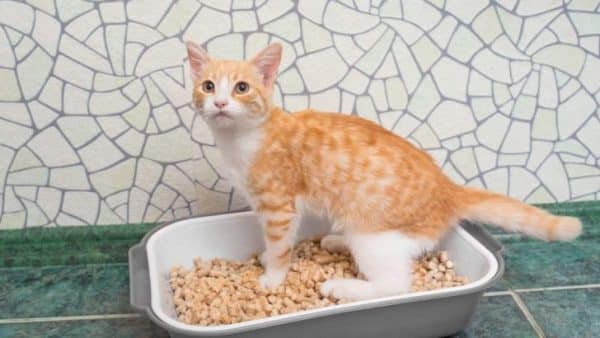
It might seem strange to discover your furry friend resting in their litter box, but this behavior is more common than you might think.
There are various reasons behind it, ranging from medical issues to anxiety and stress. It’s crucial to figure out why your cat is seeking solace in the litter box so you can address the underlying causes and take steps accordingly.
1. In Case of Urinary Problems
Cats are prone to urinary tract infections. This can lead to discomfort and increased time spent in the litterbox. If you notice your cat lingering in the box for extended periods, drinking more water than usual, and producing little urine, consult a veterinarian as soon as possible to check the underlying issue.
2. In Case of Any Underlying Medical Conditions
Cats with serious health problems and medical conditions may seek refuge in the litterbox. This behavior stems from an instinct to find a secure place when feeling unwell.
If your cat displays this sudden shift in behavior alongside symptoms like loss of appetite and excessive hiding, check their behavior and seek veterinary care promptly.
3. In Case of Anxiety and Stress
Like sick cats, those experiencing anxiety tend to seek shelter and may choose the litter box. Changes in the household environment, such as introducing a new pet or a loud thunderstorm, can trigger this behavior. If such a situation arises, consider these steps:
- Consult a vet about potential anti-anxiety medication to ease your cat’s stress.
- Ensure you have multiple litter boxes, ideally one more than the number of cats in your household.
- Spend quality time with your cat through play, grooming, or simply cuddling.
- Increase physical activity with interactive toys, cat trees, and possibly leash training for outdoor walks.
4. When You Relocate to a New Home
Moving to a new home or a new environment can be overwhelming for cats, who are sensitive to changes. It is normal for a cat to seek comfort in their familiar litter box during their initial days in a new home.
Given time, most cats will naturally explore their surroundings. For particularly sensitive cats, temporary anti-anxiety medication or a nearby hiding spot can provide reassurance.
5. In Case If The Cat is Pregnant
Pregnant cats seek out secure, enclosed spaces to give birth. If a suitable spot is not provided, they may resort to the litterbox. Offer a clean, soft box adjacent to the litterbox to ensure your expecting cat has a comfortable birthing space without straying too far from her future kittens.
6. In Case of Litter Change
Altering the type of litter used can be confusing for cats. They may cozy up in the litterbox if they don’t associate it with their usual bathroom spot. Gradually transitioning from the old to the new litter type can help them adjust comfortably.
If you observe your cat consistently lying or sleeping in their litterbox, contacting a veterinarian is the first step, as it signifies an underlying medical concern.
By addressing the root cause and providing the right support and environment, you can ensure your cat feels secure and comfortable outside their litter box.
Conclusion
If you find your cat lying in the litterbox, there could be a few simple reasons behind this behavior.
It is important to remember that cats use their litterbox for more than just using them as their washroom; it is also a safe and familiar space for them. They might be seeking comfort, warmth, or even privacy. Check the cleanliness of the litterbox regularly.
Additionally, consider the location of the box. Even if your cat feels unwell or in pain, they may seek solace in the litterbox. In such cases, a visit to the vet is recommended to check for any underlying problem.
So, if you notice your cat lying in the litterbox, take a moment to understand their behavior, assess their surroundings, and make any necessary adjustments.

